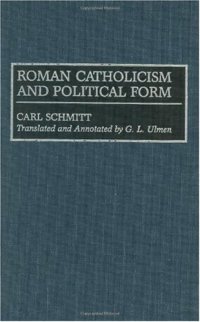
Ebook: Roman Catholicism and Political Form (Contributions in Political Science)
Author: Carl Schmitt
- Year: 1996
- Publisher: Greenwood Press
- Language: English
- pdf
According to G. L. Ulmen, translator of Roman Catholicism and Political Form, this book is important not only for its content, even more relevant at the end than at the beginning of this century, but also for its author, one of the 20th century's most seminal thinkers. While exploring and elaborating the meaning of "political theology" in Germany in the 1920s, Carl Schmitt had occasion to address the question of the relation between Roman Catholicism and the modern--even post-modern--world. As Schmitt saw it, the state, as the principal agent of secularization and the supreme accomplishment of occidental rationalism, was the core institution of the modern world, which lasted from the 16th to the end of the 19th century, when the assumptions and concepts of the jus publicum Europaeum and the Eurocentric epoch of world history began to decline. Asserting that "all significant concepts of the modern theory of the state are secularized theological concepts," Schmitt felt the need to address the question of what political form might replace the state. It was in this context that he wrote Roman Catholicism and Political Form, which presupposes an affinity not only between the Church and the state, but between Catholicism and political thinking. Once the state began to lose its monopoly of politics and, thereby, its legitimacy, Schmitt looked to the other side of the occidental equation--the Catholic Church--in search of a new form of the political. His argument proceeds from the assumption that there is a structural identity between "the metaphysical image of the world a particular age creates" and "the form of a political organization."
Download the book Roman Catholicism and Political Form (Contributions in Political Science) for free or read online
Continue reading on any device:

Last viewed books
Related books
{related-news}
Comments (0)